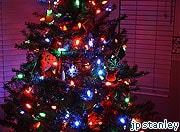Christmas trees should be removed from public places, because they might make non-Christians feel excluded, according to research by Canadian psychologists.
The study was carried out by researchers at the Simon Fraser University in Canada (SFU).
Their research findings appeared in the November edition of the Journal of Experimental Social Psychology.
Tree or no tree?
Participants in the survey sat in a room with a twelve inch Christmas tree in it and then in a room where it was not present and were asked how they felt on each occasion.
The survey was conducted among 77 Christians and 57 non-Christians, including Sikhs and Buddhists.
The results showed that, while Christians felt positive when the tree was in the room, “non-celebrators” felt less sure of themselves.
Emotional well-being
Michael Schmitt, an associate psychology professor at SFU, led the research project.
“This research demonstrates that the pervasive presence of Christmas displays in December makes people who do not celebrate Christmas feel like they don’t belong”, he said.
“It harms their emotional well-being.”
Debates
Prof Schmitt had been prompted to conduct the research by the now-yearly debates over Christmas decorations in public spaces.
It occurred to him as a social psychologist, he said, that he could provide data on the effect of decorations.
And he added that the results of the study would be better than “people just sort of speculating”.
But the participants were not told that the survey was about Christmas.
Safest option
Schmitt believes the survey’s results show that people should take a closer look at how Christmas decorations affect minorities.
“We’re not suggesting ‘no Christmas’ or ‘no Christmas displays at all'”, he said.
“But in contexts where we really do value respecting and including diversity in terms of religion, the safest option is not to have these kinds of displays.
“That would go a long way toward creating a more multicultural or inclusive society.”

